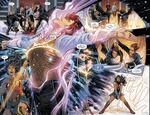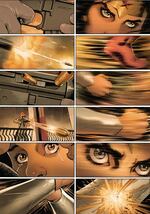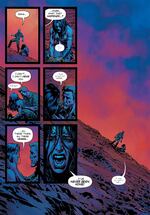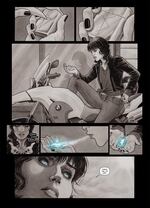The Portland-based comic book writer Greg Rucka is one of the giants in Oregon’s comics ecosystem. And he has a unique relationship with Wonder Woman, having two acclaimed runs writing the character for DC Comics, including the present “Wonder Woman: Rebirth” series, with artists Nicola Scott, Liam Sharpe and Bilquis Evely. He’ll stay with Diana through July when up-and-comer Shea Fontana (DC Super Hero Girls) takes over.
For someone with such extensive chops writing iconic superheroes, Rucka’s grounding is in hard-boiled detective stories. He got started writing P.I. thrillers as a young man in Eugene.

A catalytic moment in "Wonder Woman: Rebirth #20," written by Greg Rucka; art by Bilquis Evely; colored by Romulo Fajardo Jr.
Courtesy of DC Comics
But a meeting with the founders of the comic book publisher Oni Press launched him on a journey that gave us hundreds of stories, including the South Pole murder mystery “Whiteout”; inventive takes on the police who play second fiddle to Batman in “Gotham Central”; the spy series “Queen and Country”; and two acclaimed runs writing “Wonder Woman.”
Rucka talked to us about Wonder Woman, the complex dual storyline he orchestrated for “WW: Rebirth” and the incredibly wide range of projects he’s working on, from his hard-boiled heroine Dex in Portland-based “Stumptown” (Oni Press), the supernatural detective story, “Black Magick” (Image Comics), the futuristic sci-fi thriller “Lazarus” (Image Comics), the immortal warriors of “The Old Guard” (Image Comics) and more.
Here are a few highlights.
On how his addiction to detective stories paved the way for the kind of comics he writes
"I’ve always looked at the private investigator form as being as uniquely America as jazz. It is an American form. And it’s a form of commentary. There is a social relevance to the form. Shifting into comics, they engage both these things. There’s always an element of suspense. And in mainstream comics, when you talk about characters like Superman, Batman and Wonder Woman, you are talking about stories of core heroism. I believe in the merit of those stories. You can make arguments Batman is a traumatized, marginally sane individual, but I have no interest in that. If he’s mentally ill, his heroism is suspect. We need to present these characters as fallible, flawed but always willing to try to rise above to serve a greater good. I believe we need that. There’s a place for those stories and we don’t have a lot of those anymore."

An action sequence from "Wonder Woman: Rebirth #10," written by Greg Rucka; art by Nicola Scott; color by Romulo Fajardo, Jr.
Courtesy of DC Comics
On how he came to Wonder Woman
"The elements of Greek mythology always appealed to me. I loved that — for a long time — she was the only woman in this world of men. It very much spoke to me that she was a peer, never anything less. I’d been at DC for a few years, and I’d had my eye on the book. I spent a lot of time thinking about my Diana. I was at San Diego Comicon and then-publisher of DC Jenette Kahn came up to me. It had gone quiet in the booth. She introduced herself, and then she said — and it was like meeting in Berlin during the Cold War — she said, 'I understand you’re interested in a certain character.' And I knew immediately who she was talking about. I actually think what got me past the first hurdle was that I turned to the feminism inherent in the character. I said, 'She’s a fundamentally political character.' This is one of the things that differentiates her enormously. Diana is created with a social and political agenda — not to sell books. She comes on the scene and she arrives saying, 'You’re doing it wrong. You’ve living wrong. There is a better way to do this.'"

Panels From "Wonder Woman: Rebirth #11," written by Greg Rucka; art by Liam Sharpe; color by Laura Martin.
Courtesy of DC Comics
On imagining Wonder Woman as a public figure
"Early on it had been presented to me that she was the ambassador from Themyscira. I had been writing detective fiction; I was also writing a lot of espionage, statecraft and things like that. No other character is expected to speak a the U.N. regularly. Let’s drill down on that and look at what it would mean. I had a friend from college who was at the state department. We went out to dinner and had a long conversation about how that would be."
On the DC trinity of Batman, Superman, and Wonder Woman and their differing approach to violence
"I’ve gotten in arguments about this with many of my peers. I think [Wonder Woman] has the most informed relationship — and perhaps the most honest. Batman’s born out of a trauma. What motivates him is, at the end of the day, a desire to prevent what happened to him at 8 from ever happening to anybody else. In the comics, he does not kill and he has gone to extraordinary lengths to learn how to be the guy who doesn’t have to. Superman, conversely, was raised with an idealism and a set of values that require him to help others. He is from a mythical Midwest. He will always seek to do well, and he’s blessed with a power set that allows him to pretty much take anything you can dish out. Diana is from a culture that — even if we say the DC Universe Amazons are not meant to be historical, Herodotus-based Amazons — it is a martial culture. It is a culture that bears greater resemblance to Sparta than anything else. That changes your relationship with violence. For Diana, I think she understands, fundamentally, that when you raise the fist — when the blade is drawn — all bets are off. I also think — and this is my personal belief — she is from a culture where mythology is real. And there are monsters. Sometimes you have to slay a monster. Sometimes that’s the only option you’ve got. It’s never her first one."
On returning to “Black Magick” (Image Comics) with collaborator Nicola Scott
"Nicola’s husband says that we’re siblings, and I think that’s fair. I’m not sure which of us is the older sibling. I’ve known Nicola coming up on 15 years, and there’s very little daylight between us on a lot of things. The art choices and the way Nic draws is — there’s so much of her invested in this. I think the book is beautiful, and the best work she’s ever done. We’ve been on hiatus, but the book returns this June. We’ll be back regularly as of August."

Detective Rowan Black, using the less traditional tools of police trade, from "Black Magick #3," written by Greg Rucka; art by Nicola Scott.
Courtesy of Image Comics
On what’s fun about writing Dex, the P.I. protagonist of “Stumptown” (Oni Press)
"She’s a hot mess. I adore her. There’s a great [Raymond] Chandler line where he says, 'The detective in the story must be the best man in his world and a good enough man for any world.' This is the 'down these mean streets a man must go, who is not himself mean, who is neither tarnished nor afraid.' They’re characters who, in one way or another, have to remove themselves from mainstream. They don’t get what we get. They stand on this border, in this liminal space where they can enter any situation. "
On how the meaning of “Lazarus” (Image Comics) has changed for him
"The series was co-created with Michael Lark. Michael is fond of saying that when we started, we were writing dystopian science fiction, and now we’re writing a documentary. I’m not going to change the overall plan of Lazarus. We know where we want it to end. I’ve spent the last several weeks looking around and going, “I’d like to tell a story about a future that is bright and shiny and good. What does that look like?” And I’m starting to drill down into research about what a Utopian future could look like. It’s something I think we’ve lost in a lot of fiction recently."
